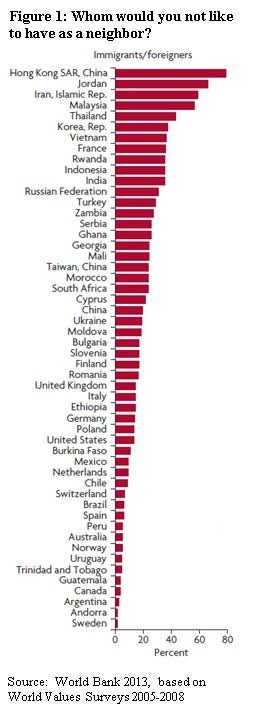Leonarda Dibrani is the 15-year-old schoolgirl who was recently ordered off a school bus in France, so she and her family could be deported to Kosovo. The political fallout of the deportation notwithstanding, Leonarda represents the triple whammy of being an “alien”, being “illegal” and being Roma.
A new report “Inclusion Matters: the Foundation for Shared Prosperity” discusses the ways in which girls like Leonarda are excluded. It notes that identity is an important driver of exclusion and places the discussion within the context of contemporary trends and transitions. It shows that migration is today’s most volatile demographic transition. The preoccupation of previous decades, with fertility and mortality, has given way to a near-panic about in-migration and fear of “illegal” migrants. And this panic is not confined to OECD countries.
 Fear, resentment and competition are rife in most countries with migrants, but especially those that realize that they need migrant workers, but are not quite ready for the social change that migration brings.
Fear, resentment and competition are rife in most countries with migrants, but especially those that realize that they need migrant workers, but are not quite ready for the social change that migration brings.
The World Values Surveys ask respondents whom they would not like to have as neighbors. The latest publicly available round of the survey, conducted between 2005 and 2008, shows that 57 to 79 percent of the respondents in Malaysia, Iran, Jordan and Hong Kong did not want to live next to immigrants and foreigners.
Animosity against migrants is often rooted in the perception that they are taking over jobs that rightfully belong to “natives”, that migrants do not respect the rules and culture of their host areas and that they are ungrateful. Resentment may be more intense when the receiving area is ethnically homogenous and migrants can be easily identified or when migrants dominate certain economic activities, and in still other instances, when migrants fare better than natives. Residents of the host area sometimes worry that an influx of less skilled workers may result in a fall in wages, affecting those who already earn low incomes. In many countries, migrants are seen as a fiscal “burden” due to a popular perception that they use up public services but do not pay commensurate taxes. When countries are undergoing economic hardship, unemployment and fiscal austerity, these issues seem to swim up to the surface. Migrants often become the favorite scapegoat in times of stress.
Those like Leonarda, who are not just migrants, but are also targeted for belonging to a stereotyped ethnic minority, it really does result in a triple whammy. The “Roma Issue” as it is being referred to in Europe of late – a term often laden with political innuendo – has heated up and is tied up with the contemporary social and economic churning that Europe is witnessing today.
So, why do we care? We care if we are in the business of ending extreme poverty and creating shared prosperity - the twin goals of the World Bank Group. We care because misinformation and stereotyping can erase the gains of social inclusion. And unless we act, girls like Leonarda will pass their disadvantage down to their children.
Please join me as I moderate an online discussion on social inclusion, with invited experts, starting October 31 on https://strikingpoverty.worldbank.org.


Join the Conversation